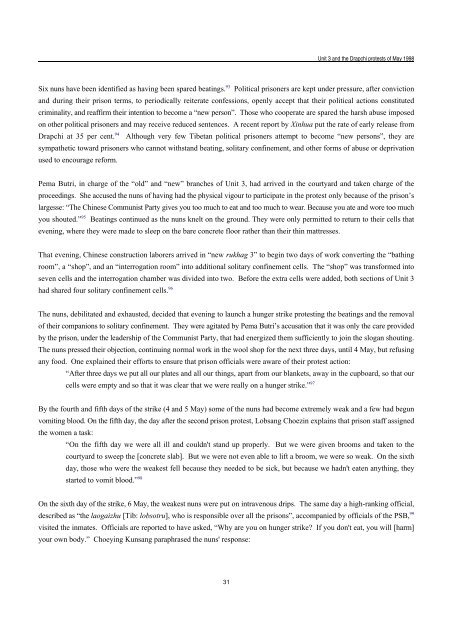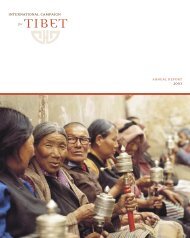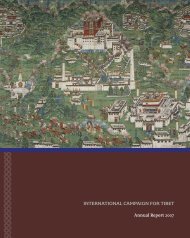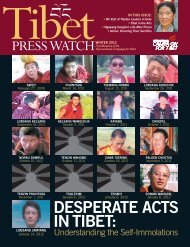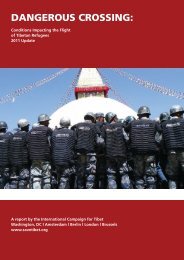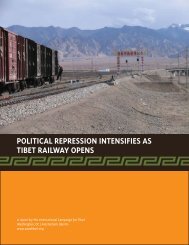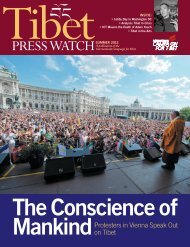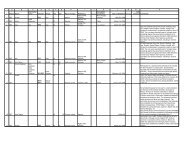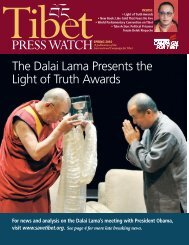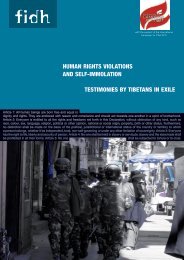Rukhag 3: The Nuns of Drapchi PrisonBecause <strong>the</strong> inmates of “new rukhag 3” were under close individual control, <strong>the</strong>ir participation in <strong>the</strong> protest was quicklybrought to an end:“From <strong>the</strong> beginning each of us [female] political prisoners had been guarded by a PSB [guard] each, and so <strong>the</strong>yimmediately took us and closed our mouths to stop us shouting. Then <strong>the</strong> [PAP] came immediately and beat ushard.” 87Warning shots were fired into <strong>the</strong> air by PAP, but <strong>the</strong>y did not take aim at <strong>the</strong> tightly intermingled group of political prisonersand security personnel. Excluded from <strong>the</strong> ceremony as potential trouble-makers, <strong>the</strong> nuns of “old rukhag 3” remainedsecured in <strong>the</strong>ir cell block adjacent to <strong>the</strong> north edge of <strong>the</strong> main prison courtyard. Windows in <strong>the</strong> cells are well above <strong>the</strong>floor, high enough to af<strong>for</strong>d a view of <strong>the</strong> courtyard; some of <strong>the</strong> women had climbed up to witness <strong>the</strong> beginning of <strong>the</strong>assembly. Choeying Gyaltsen confirms that <strong>the</strong> protest began when two men among <strong>the</strong> common criminals began shouting88slogans and scattering paper slips. As <strong>the</strong> protest became more vocal and gunshots were fired, <strong>the</strong> would-be observers leapeddown from <strong>the</strong>ir vantage points, fearing that <strong>the</strong>ir faces would be recorded by surveillance cameras trained on <strong>the</strong> block. Nodisturbance erupted in “old rukhag 3” that day.As soon as <strong>the</strong> protest had been suppressed, security personnel returned <strong>the</strong> women to <strong>the</strong>ir block, but not into <strong>the</strong>ir cells.According to Choeying Kunsang, <strong>the</strong>y were lined up in <strong>the</strong> unit’s small courtyard, where more warning shots were fired into89<strong>the</strong> air by PAP or police. Accounts make it clear that <strong>the</strong> nuns had already been completely subdued, suggesting that fur<strong>the</strong>rwarning shots would have been unnecessary. Each nun was beaten individually, in turn, with electric batons, plastic tubes90or hoses filled with sand, belts wielded with buckle end out, and rifle butts. One of <strong>the</strong> nuns present told TIN that all <strong>the</strong>women assembled in <strong>the</strong> block’s courtyard were beaten, but that “because of <strong>the</strong> beatings and <strong>the</strong> blood we didn't see who was91who”. Choeying Kunsang describes <strong>the</strong> sequence:“It was a big disturbance. Many soldiers [PAP], and many vehicles came from outside near <strong>the</strong> gate. Many soldierscame and <strong>the</strong>y fired guns a lot, but <strong>the</strong>y didn't shoot at people, because at that time we were being held by PSB andsoldiers. They fired [warning shots] into <strong>the</strong> air. The bullet cartridges fell on <strong>the</strong> ground near us. [At] that time<strong>the</strong>y separated <strong>the</strong> different rukhag and took us back to <strong>the</strong> buildings. Our rukhag is a bit far away. After <strong>the</strong>yarrived in <strong>the</strong> [Unit 3] courtyard <strong>the</strong>y fired many [more] shots. They didn't fire at people, <strong>the</strong>y fired in <strong>the</strong> air. When<strong>the</strong>y took us [back to our rukhag], <strong>the</strong>y beat us with <strong>the</strong> metal front of <strong>the</strong>ir belts, <strong>the</strong>re was no one who was not[covered with] blood. When we arrived in <strong>the</strong> courtyard, and after <strong>the</strong>y closed <strong>the</strong> gate, we were made to line up andwe were individually beaten very badly. They beat us with <strong>the</strong>se black plastic sticks.” 92Initial beating allegedly lasted <strong>for</strong> three hours, after which 16 nuns were taken away and put into solitary confinement cells.Three would remain <strong>the</strong>re <strong>for</strong> three months be<strong>for</strong>e receiving sentence extensions and being returned to shared cells. Theo<strong>the</strong>rs, all 13 of whom have been identified, were <strong>report</strong>edly kept in solitary confinement <strong>for</strong> seven months, until December1998. According to sources, more would have been placed into solitary cells if more space had been available.After 16 of <strong>the</strong> nuns had been removed, <strong>the</strong> rest were made to kneel on <strong>the</strong> concrete slab of <strong>the</strong> courtyard. TIN's researchindicates that, after discounting those taken to punishment cells, as well as those who were ei<strong>the</strong>r already in solitary cells orwho were excused from <strong>the</strong> abusive session, <strong>the</strong>re would have been approximately 45 prisoners remaining in <strong>the</strong> courtyard,all of <strong>the</strong>m nuns.30
Unit 3 and <strong>the</strong> Drapchi protests of May 199893Six nuns have been identified as having been spared beatings. Political prisoners are kept under pressure, after convictionand during <strong>the</strong>ir prison terms, to periodically reiterate confessions, openly accept that <strong>the</strong>ir political actions constitutedcriminality, and reaffirm <strong>the</strong>ir intention to become a “new person”. Those who cooperate are spared <strong>the</strong> harsh abuse imposedon o<strong>the</strong>r political prisoners and may receive reduced sentences. A recent <strong>report</strong> by Xinhua put <strong>the</strong> rate of early release from94Drapchi at 35 per cent. Although very few <strong>Tibet</strong>an political prisoners attempt to become “new persons”, <strong>the</strong>y aresympa<strong>the</strong>tic toward prisoners who cannot withstand beating, solitary confinement, and o<strong>the</strong>r <strong>for</strong>ms of abuse or deprivationused to encourage re<strong>for</strong>m.Pema Butri, in charge of <strong>the</strong> “old” and “new” branches of Unit 3, had arrived in <strong>the</strong> courtyard and taken charge of <strong>the</strong>proceedings. She accused <strong>the</strong> nuns of having had <strong>the</strong> physical vigour to participate in <strong>the</strong> protest only because of <strong>the</strong> prison’slargesse: “The Chinese Communist Party gives you too much to eat and too much to wear. Because you ate and wore too much95you shouted.” Beatings continued as <strong>the</strong> nuns knelt on <strong>the</strong> ground. They were only permitted to return to <strong>the</strong>ir cells thatevening, where <strong>the</strong>y were made to sleep on <strong>the</strong> bare concrete floor ra<strong>the</strong>r than <strong>the</strong>ir thin mattresses.That evening, Chinese construction laborers arrived in “new rukhag 3” to begin two days of work converting <strong>the</strong> “bathingroom”, a “shop”, and an “interrogation room” into additional solitary confinement cells. The “shop” was trans<strong>for</strong>med intoseven cells and <strong>the</strong> interrogation chamber was divided into two. Be<strong>for</strong>e <strong>the</strong> extra cells were added, both sections of Unit 3had shared four solitary confinement cells. 96The nuns, debilitated and exhausted, decided that evening to launch a hunger strike protesting <strong>the</strong> beatings and <strong>the</strong> removalof <strong>the</strong>ir companions to solitary confinement. They were agitated by Pema Butri’s accusation that it was only <strong>the</strong> care providedby <strong>the</strong> prison, under <strong>the</strong> leadership of <strong>the</strong> Communist Party, that had energized <strong>the</strong>m sufficiently to join <strong>the</strong> slogan shouting.The nuns pressed <strong>the</strong>ir objection, continuing normal work in <strong>the</strong> wool shop <strong>for</strong> <strong>the</strong> next three days, until 4 May, but refusingany food. One explained <strong>the</strong>ir ef<strong>for</strong>ts to ensure that prison officials were aware of <strong>the</strong>ir protest action:“After three days we put all our plates and all our things, apart from our blankets, away in <strong>the</strong> cupboard, so that ourcells were empty and so that it was clear that we were really on a hunger strike.” 97By <strong>the</strong> fourth and fifth days of <strong>the</strong> strike (4 and 5 May) some of <strong>the</strong> nuns had become extremely weak and a few had begunvomiting blood. On <strong>the</strong> fifth day, <strong>the</strong> day after <strong>the</strong> second prison protest, Lobsang Choezin explains that prison staff assigned<strong>the</strong> women a task:“On <strong>the</strong> fifth day we were all ill and couldn't stand up properly. But we were given brooms and taken to <strong>the</strong>courtyard to sweep <strong>the</strong> [concrete slab]. But we were not even able to lift a broom, we were so weak. On <strong>the</strong> sixthday, those who were <strong>the</strong> weakest fell because <strong>the</strong>y needed to be sick, but because we hadn't eaten anything, <strong>the</strong>ystarted to vomit blood.” 98On <strong>the</strong> sixth day of <strong>the</strong> strike, 6 May, <strong>the</strong> weakest nuns were put on intravenous drips. The same day a high-ranking official,described as “<strong>the</strong> laogaizhu [Tib: lobsotru], who is responsible over all <strong>the</strong> prisons”, accompanied by officials of <strong>the</strong> PSB, 99visited <strong>the</strong> inmates. Officials are <strong>report</strong>ed to have asked, “Why are you on hunger strike? If you don't eat, you will [harm]your own body.” Choeying Kunsang paraphrased <strong>the</strong> nuns' response:31
- Page 4 and 5: Tibet Information NetworkTibet Info
- Page 8 and 9: Table of Contents1. Introduction ..
- Page 10 and 11: Image 15: Gyabdrag Nunnery, in the
- Page 12: Rukhag 3: The Nuns of Drapchi Priso
- Page 15 and 16: Female political prisoners at Drapc
- Page 17 and 18: Female political prisoners at Drapc
- Page 19 and 20: Female political prisoners at Drapc
- Page 21 and 22: Female political prisoners at Drapc
- Page 23 and 24: Female political prisoners at Drapc
- Page 25 and 26: Female political prisoners at Drapc
- Page 27 and 28: Female political prisoners at Drapc
- Page 29 and 30: Female political prisoners at Drapc
- Page 31 and 32: Female political prisoners at Drapc
- Page 33 and 34: Female political prisoners at Drapc
- Page 35 and 36: Female political prisoners at Drapc
- Page 37 and 38: Unit 3 and the Drapchi protests of
- Page 39: Unit 3 and the Drapchi protests of
- Page 43 and 44: Unit 3 and the Drapchi protests of
- Page 45 and 46: Unit 3 and the Drapchi protests of
- Page 47 and 48: Unit 3 and the Drapchi protests of
- Page 49 and 50: Unit 3 and the Drapchi protests of
- Page 51 and 52: Unit 3 and the Drapchi protests of
- Page 53 and 54: Unit 3 and the Drapchi protests of
- Page 55 and 56: Unit 3 and the Drapchi protests of
- Page 57 and 58: Unit 3 and the Drapchi protests of
- Page 59 and 60: Unit 3 and the Drapchi protests of
- Page 61 and 62: Unit 3 and the Drapchi protests of
- Page 63 and 64: Unit 3 and the Drapchi protests of
- Page 65 and 66: Unit 3 and the Drapchi protests of
- Page 67 and 68: Unit 3 and the Drapchi protests of
- Page 69 and 70: Conclusion4. ConclusionThe women no
- Page 71 and 72: Appendices5. AppendicesPrisoner lis
- Page 73 and 74: Appendices500Tibetan political pris
- Page 75 and 76: List 2: Drapchi Prison: Unit 3 nuns
- Page 77 and 78: TIN# status code name lay name det.
- Page 79 and 80: List 4: Female political prisoners
- Page 81 and 82: TIN # status code name lay name det
- Page 83 and 84: TIN# status code name lay name det.
- Page 85 and 86: TIN # status code name lay name det
- Page 87 and 88: TIN # status code name lay name det
- Page 89 and 90: List 8c: Male Tibetan political pri
- Page 91 and 92:
List 10: Female political prisoners
- Page 93 and 94:
4 495-0442 REL Ngawang Tenzin Yangd
- Page 95 and 96:
95-0074 REL Tsultrim Choedron Tseri
- Page 97 and 98:
EndnotesPrefecture, to the west of
- Page 99 and 100:
Endnotes40. TIN Doc 399 names the d
- Page 101 and 102:
Endnotes75. TIN Doc 39976. TIN Doc
- Page 103 and 104:
EndnotesNgawang Sungrab was taken t
- Page 105 and 106:
Endnotes159. TIN Doc 1(sd). Sonam T
- Page 107 and 108:
Images6. ImagesA. Nuns and nunnerie
- Page 109 and 110:
ImagesExtended sentences, currently
- Page 111 and 112:
ImagesImage 13: Chubsang Nunnery, o
- Page 113 and 114:
ImagesImage 15: Gyabdrag Nunnery, i
- Page 115 and 116:
ImagesImage 16b: Mechungri Nunnery,
- Page 117 and 118:
ImagesImage 18: Shar Bumpa Nunnery,
- Page 119 and 120:
ImagesB. Drapchi PrisonImage 20: Dr
- Page 121 and 122:
ImagesImage 21: Drapchi Prison, lat
- Page 123 and 124:
ImagesImage 23: Drapchi Prison, are
- Page 125 and 126:
ImagesImage 25: Drapchi Prison, are
- Page 127 and 128:
ImagesImage 27: Drapchi Prison, are
- Page 129 and 130:
ImagesImage 29: Drapchi Prison, are
- Page 131 and 132:
ImagesImage 30: Lhasa Prison (forme
- Page 133 and 134:
ImagesImage 32: new prison in Sangy
- Page 135 and 136:
ImagesImage 34: Trisam Re-education
- Page 137:
127Images


